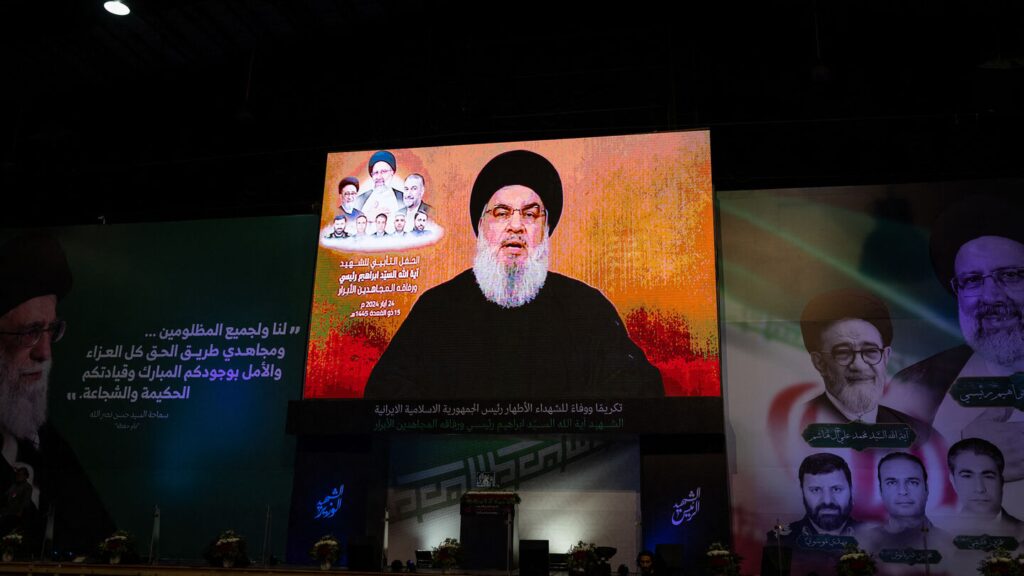
After decades of leading Hezbollah and overseeing its rise both in Lebanon and in the region, Secretary-General Hassan Nasrallah was killed in an Israeli strike in Beirut.
BEIRUT — Hezbollah’s powerful leader, Hassan Nasrallah, was killed in a major Israeli strike in the southern suburbs of the Lebanese capital, Beirut, on Friday, marking a significant blowback for the group.
Both Hezbollah and Israel confirmed Nasrallah’s death on Saturday.
Nasrallah, 64, had headed the Shiite paramilitary group since 1992. Since Hamas’ Oct. 7 attack and the ensuing Israeli war on Gaza, Hezbollah, which is designated by the US and several other countries as a terror group, has been engaged in heavy cross-border fire with Israel in a show of support for the Gaza Strip.
Who was Nasrallah?
Nasrallah was born to a poor family in August 1960 in the Burj Hammoud neighborhood in eastern Beirut. He was the eldest of nine brothers and sisters, and his father reportedly sold vegetables from a small stall he owned.
Nasrallah spent his childhood in the predominantly Christian area before the family fled to the village of Bazourieh near the southern city of Tyre when the Lebanese civil war broke out in 1975.
There, Nasrallah completed his high school studies and briefly joined the Amal Movement, a Shiite political group.
From 1976 to 1978, Nasrallah was in Najaf, Iraq, where he attended Quranic studies. But the Sunni Baath party’s crackdown against Shiites in Iraq at the time forced him to return to Lebanon. He completed his studies in Iran in 1989.
Nasrallah married Fatima Yassin in 1978 and had five children — including Hadi, who was killed in an Israeli ambush in south Lebanon when he was 18 in 1997.
Rise of Nasrallah
Nasrallah was 22 when Hezbollah was founded by a group of Shiite clerics and followers of Iran’s Ayatollah Ruhollah Khomeini in 1982 to fight the second Israeli invasion of Lebanon at the time.
He joined Hezbollah shortly after its establishment and held several positions in the group throughout the years, including director of Hezbollah in the Bekaa region and in Beirut.
In 1992, Nasrallah succeeded Abbas al-Musawi as secretary-general of Hezbollah, after the latter was killed in a missile attack by Israeli helicopters that targeted his convoy in southern Lebanon.
Under Nasrallah, Hezbollah — which is heavily backed by Iran — turned from a small militia to a large paramilitary group and a major political player in Lebanon.
Today, Hezbollah is believed to consist of 50,000 to 100,000 fighters, and its vast arsenal is estimated to include some 150,000 to 200,000 rockets, mortar bombs and missiles.
Nasrallah had said in October 2021 that his powerful group had 100,000 “trained” and “armed” fighters at its disposal.
Nasrallah gained popularity after the 2000 Israeli withdrawal from south Lebanon. He also played a major role in securing a historic prisoner swap between his group and Israel in 2004, during which hundreds of Hezbollah members, Palestinians and other Arab nationalities held by Israel were released in exchange for four Israelis.
Further consolidating his role, Nasrallah claimed “divine victory” against Israel following the 34-day war in July 2006. The conflict left at least 1,190 deaths in Lebanon and forced nearly 900,000 into displacement, while much of the country’s infrastructure was destroyed. At least 160 Israelis were killed in Israel, including civilians and soldiers.
In the past decade, Hezbollah quickly became one of Iran’s main proxy arms in the region, receiving weapons, training and funding from the Islamic Republic. Hezbollah sent fighters to Syria to fight alongside President Bashar al-Assad’s forces throughout the Syrian civil war, and to Yemen in support of the Houthi rebels.
More recently, Hezbollah began launching rockets at Israel Oct. 8, 2023, one day after the Israel-Hamas war in the Gaza Strip erupted. In a speech in November, Nasrallah said the fight against Israel was in solidarity with the Hamas group and the Palestinian people and vowed to continue fighting until the Gaza war ends.
He repeated this promise throughout his speeches in the past months. In his last speech last week following the pager and walkie-talkie explosions in Lebanon, he said, “The resistance in Lebanon will not stop supporting and assisting the people of Gaza, the West Bank and the oppressed.”
Often described as charismatic, Nasrallah enjoyed the wide support of Shiites in Lebanon and in other Arab countries with Shiite populations, including Syria, Yemen and Iraq.
He repeatedly delivered fiery speeches during times of conflicts and wars, inciting his popular base.
Nasrallah had been living in hiding for years now for fear of an Israeli assassination. According to reports, he would move under heavy security to a central bunker to hold meetings with his group’s members or other officials.
